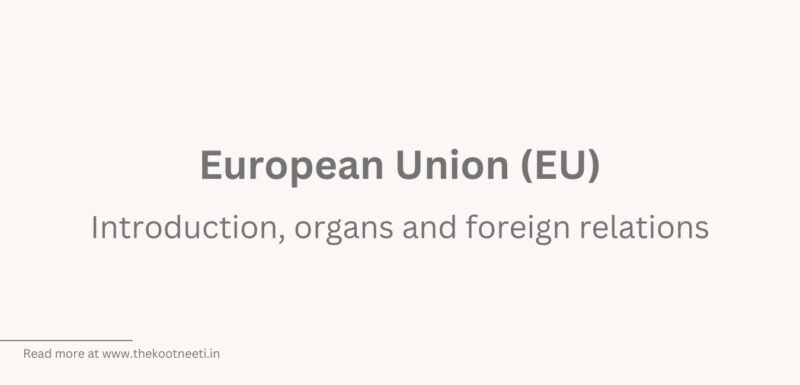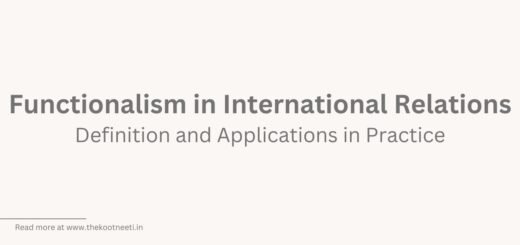European Union (EU); Introduction, organs and foreign relations

The European Union (EU) is a political and economic union of 27 member states located in Europe. The EU was established by the Maastricht Treaty in 1993 and has since grown to become a major player in international relations.
The EU is designed to promote cooperation and integration among its member states in a wide range of areas, including trade, economics, foreign policy, and security. It has its own currency, the euro, and a single market in which goods, services, and people can move freely.
The EU is governed by a number of institutions, including the European Parliament, which represents the interests of EU citizens; the European Commission, which is responsible for proposing and implementing EU legislation; and the European Council, which sets the EU’s overall political direction.
The EU has played a significant role in promoting stability and prosperity in Europe and has become an important actor in global politics. It is a major trading partner for many countries around the world, and it is also involved in a number of international organizations, including the United Nations and the World Trade Organization.
Organs of the European Union (EU)
The European Union (EU) has a number of institutions and bodies that work together to govern and represent the interests of the EU and its member states. These include:
- European Parliament: The European Parliament is the legislative arm of the EU and represents the interests of EU citizens. It is made up of 705 members elected by voters in the EU member states.
- European Commission: The European Commission is the executive body of the EU and is responsible for proposing and implementing EU legislation. It is made up of 27 Commissioners, one from each member state.
- European Council: The European Council is made up of the heads of state or government of the EU member states, and it sets the overall political direction of the EU.
- Council of the European Union: The Council of the European Union, also known as the Council of Ministers, represents the governments of the EU member states and is responsible for adopting EU laws and coordinating EU policies.
- European Court of Justice: The European Court of Justice is the highest court in the EU and is responsible for interpreting EU law and ensuring that it is applied uniformly across the member states.
- European Central Bank: The European Central Bank is responsible for monetary policy in the EU and is responsible for maintaining price stability in the euro area.
Overall, these institutions and bodies work together to govern and represent the interests of the EU and its member states.
EU relations with the US
The European Union (EU) and the United States (US) have a close and complex relationship that is shaped by a variety of factors, including economic ties, shared values, and security interests.
In terms of economics, the EU and the US are major trading partners, and they have established a number of agreements to facilitate trade and investment, including the Transatlantic Trade and Investment Partnership (TTIP).
The EU and the US also share a number of values, including democracy, human rights, and the rule of law, and they work together on issues such as climate change and global development.
In terms of security, the EU and the US are also key partners, and they cooperate on a range of issues, including counterterrorism, cyber security, and peacekeeping.
Overall, the relationship between the EU and the US is multifaceted and complex, and it has significant implications for the two sides and the broader international community.
EU relations with China
The European Union (EU) and China have a complex and multifaceted relationship that is shaped by a range of factors, including economic ties, political differences, and strategic interests.
In terms of economics, the EU and China are major trading partners, and they have established a number of agreements to facilitate trade and investment. However, the relationship has also been marked by tensions, including concerns over China’s trade practices and the impact of Chinese imports on European industry.
Politically, the EU and China have a number of differences, including on issues such as human rights, democracy, and the rule of law. The EU has been critical of China’s human rights record and has called for greater political reform in the country.
In terms of strategic interests, the EU and China have also had a somewhat complex relationship. The EU has sought to engage with China on issues such as climate change and global development, but it has also expressed concerns about China’s growing influence and assertiveness in international affairs.
Overall, the relationship between the EU and China is complex and multifaceted, and it is likely to continue to evolve in the coming years.
EU relations with India
The European Union (EU) and India have a strong and multifaceted relationship that is shaped by a range of factors, including economic ties, shared values, and strategic interests.
In terms of economics, the EU and India are major trading partners, and they have established a number of agreements to facilitate trade and investment, including a bilateral Free Trade Agreement.
The EU and India also share a number of values, including democracy, human rights, and the rule of law, and they work together on issues such as climate change and global development.
In terms of strategic interests, the EU and India have also had a close relationship. The EU has sought to engage with India on issues such as counterterrorism, cyber security, and peacekeeping, and the two sides have also cooperated on regional and global issues.
Overall, the relationship between the EU and India is strong and multifaceted, and it is likely to continue to evolve in the coming years.



















